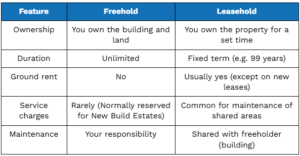When buying a home in England or Wales, one of the most important things to understand is whether the property is freehold or leasehold. These are the two main types of property ownership, and the difference can affect your rights, responsibilities, and long-term costs.
In this Blog we’ll explain the key differences between freehold and leasehold property, what they mean in practice, and how recent legal changes may affect your decision.
What Is a Freehold Property?
Owning the freehold of a property means you own both the building and the land it stands on. It’s the most complete form of ownership.
You’re responsible for maintaining the property, including the structure, roof, and land. But you also don’t pay ground rent or service charges, which makes it simpler and often more cost-effective in the long run.
Most houses in England and Wales are sold as freeholds.
What Is a Leasehold Property?
With a leasehold, you own the property for a fixed number of years – but not the land it’s built on. This is common with flats and some houses, especially in new-build developments.
You enter into a legal agreement (the lease) with the freeholder (landowner), which sets out how long you can live there. Most leases are originally granted for 99 or 125 years. When that time runs out, ownership of the property returns to the freeholder unless you extend the lease.
Leaseholders often have to pay:
✅Ground rent – an annual payment to the freeholder
✅ Service charges – to cover maintenance of communal areas
✅ Permission fees – for things like home improvements
There are also restrictions in the lease, such as whether you can sublet, keep pets, or make alterations. These vary depending on the property.
Practical Differences at a Glance

Why Lease Length Matters
If you’re buying a leasehold property, the length of the lease matters. Once it drops below 80 years, the property can be harder to sell or mortgage, and lease extension becomes more expensive due to something called marriage value.
Should I Avoid Leasehold?
Not necessarily. Many fantastic properties, especially flats, are leasehold. But it’s vital to understand the terms of the lease – including the length, ground rent, service charges, and any restrictions.
Before making an offer, ask your solicitor or conveyancer to review the lease carefully. They can help you understand your rights and highlight any issues.
Need Help Navigating Property Ownership?
Whether you’re buying your first home or adding to your portfolio, understanding the difference between freehold and leasehold is key to making an informed decision.
At Dudden Law, our experienced property team is here to guide you through the process – from reviewing leases to handling freehold purchases or lease extensions.
📧 Get in touch with us today at property@duddenlaw.co.uk for expert conveyancing advice tailored to your needs.
Written By
Molly Davies
Trainee Solicitor




